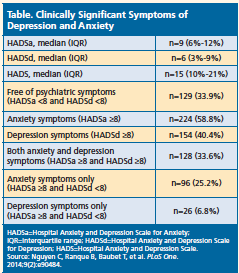Greater Prevalence of Clinically Significant Anxiety and Depression among SSc Cohort
Systemic sclerosis (SSc) is a connective-tissue disease characterized by excessive collagen deposition in the dermis and internal organs. Along with decreased survival, the disease is responsible for skin, tendon, joint, and vessel damage, which leads to disability and compromised health-related quality of life (HRQoL). Furthermore, patients experience clinically significant psychiatric symptoms.
Few studies have assessed the clinically significant symptoms of depression and/or anxiety in SSc patients. In a recent study, researchers sought to identity clinical, functional, and HRQoL associated with clinically significant symptoms of depression and/or anxiety in a cohort of French patients with SSc [PLoS One. 2014;9(2):e90484].
This cross-sectional survey included 381 patients who fulfilled the American College of Rheumatology and/or Leroy and Medsger criteria for SSc. Patients with SSc were prospectively included during 7 consecutive annual meetings of the French SSc patient association, the ‘‘Association des Sclérodermiques de France’’ (ASF), between 2003 and 2009, or during their hospitalization in Cochin (between January 2006 and June 2009) or Claude Huriez (between January 2009 and June 2009) hospitals. Patients had to complete self-administered questionnaires first and then undergo an interview with a physician to check for unanswered questions, fully complete questionnaires, and gather clinical data. The cohort was assessed for visceral involvement, disability, and HRQoL. HRQoL was evaluated using the French version of the Medical Outcomes Study 36-Item Short Form Health Survey (SF-36). Clinically significant symptoms of anxiety and depression were evaluated using the Hospital Depression Scale, with a defined cutoff of ≥8.
Of the 381 patients, 143 of them were recruited during their hospitalization in Cochin (n=135) or Claude Huriez (n=16) hospitals, and the remaining 238 were recruited during ASF annual meetings. A total of 149 (40.3%) patients had diffuse cutaneous SSc, 187 (50.5%) had limited cutaneous SSc, and 34 (9.2%) had limited SSc.
The results showed that high levels of clinically significant symptoms of anxiety (58.8%) and depression (40.4%) were observed among SSc patients; whereas, 33.9% were free of both clinically significant symptoms of anxiety and of depression (See Table below). Patients with clinically significant symptoms of depression had poorer health status and HRQoL physical component score and greater global and localized disabilities and aesthetic impairment compared to patients without depression. Patients with clinically significant symptoms of anxiety had poorer SF-36 mental and physical component scores than patients without anxiety symptoms.












